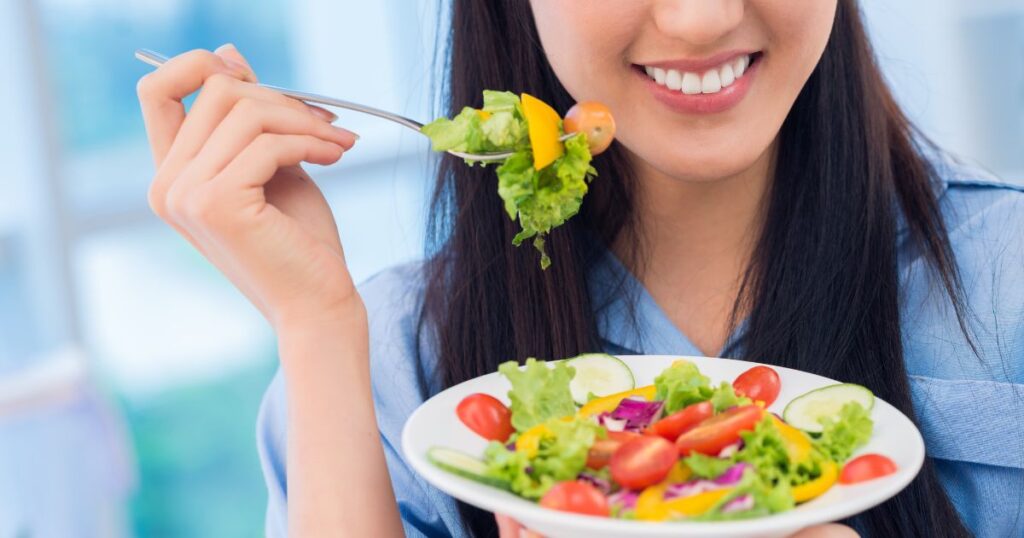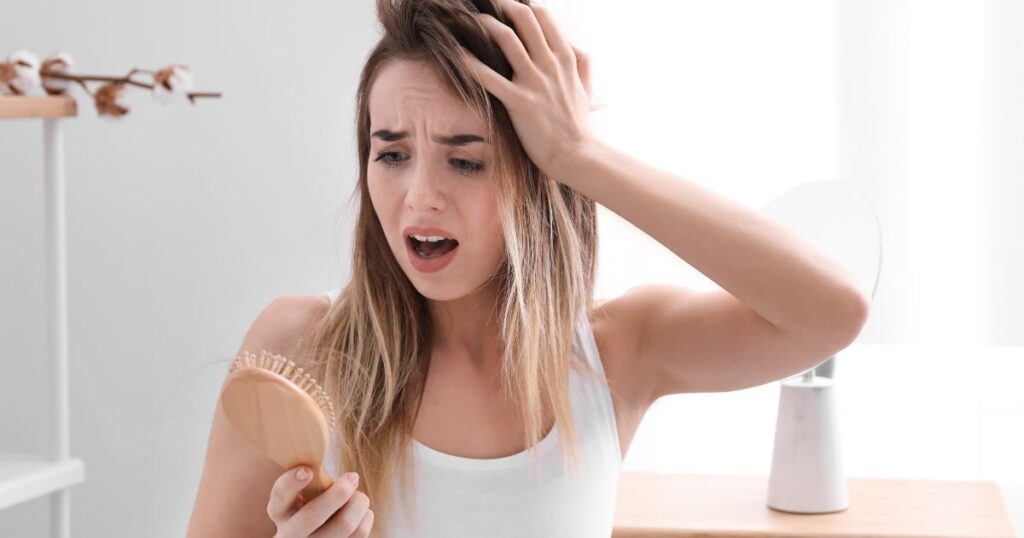Biotin, also known as Vitamin B7, is a vital, water-soluble nutrient that falls under the B-vitamin complex. It plays a crucial role in our body’s metabolic processes, converting food into energy and aiding in the synthesis of fatty acids and amino acids. This essential B vitamin is not only fundamental for our energy metabolism but also contributes to the health of our hair, skin, and nails, sparking widespread interest in its dietary and supplemental forms.
In this article, we will explore various aspects of biotin:
- Definition and Role: Understanding what biotin is and its importance in bodily functions.
- Health Benefits: Insights into how biotin contributes to well-being, particularly concerning hair, skin, and nails, while also touching upon the scientific community’s stance on these benefits.
- Dietary Sources: Highlighting natural food sources rich in biotin to encourage a balanced intake through diet.
- Recommended Daily Intake: Discussing the adequate intake levels to prevent deficiency and ensure optimal health.
- Deficiency and Toxicity: Identifying the signs of biotin deficiency, its rarity, and addressing the concerns related to toxicity.
- FAQs: Answering common questions to clarify doubts surrounding biotin supplementation and its effects.
Table of Contents - Click to Go
What is Biotin?
Biotin, known as Vitamin B7, is a critical water-soluble B vitamin with key roles in our body:
- Energy Conversion: It aids enzymes in breaking down fats, carbohydrates, and proteins into energy.
- Cellular Health: Supports the health of skin, hair, eyes, liver, and the nervous system.
- Pregnancy: Essential for embryonic growth, making it crucial for pregnant women.
Biotin’s functions extend to:
- Metabolic Processes: Important for metabolic functions, helping in the conversion of food into energy.
- DNA Regulation: Plays a role in gene expression and cell signaling.
Why It’s Essential:
- Our bodies can’t make biotin; thus, we need to consume it through our diet.
- Rare Deficiencies: Due to its availability in many foods and the body’s ability to recycle it.
Additional Roles:
- Cell Growth: Its interaction with cell growth has sparked interest for its potential beauty benefits for hair and skin, though scientific backing varie
The Health Benefits of Biotin
Biotin is celebrated for its numerous health benefits. Let’s explore these benefits and the scientific perspective on them:
Potential Benefits for Hair, Skin, and Nails
- Hair Health: Some people report improved hair strength and thickness with biotin supplements. However, scientific evidence is mixed, and benefits are more likely if there was a deficiency.
- Skin Health: Biotin may contribute to healthier skin by supporting fat metabolism, which is important for maintaining the skin’s barrier.
- Nail Strength: There’s some evidence suggesting biotin supplements can increase nail thickness and reduce splitting.
Scientific Perspective
While anecdotal evidence supports the role of biotin in improving the health of hair, skin, and nails, scientific studies provide mixed results. This indicates that while biotin may benefit individuals with deficiencies, its effects might be less pronounced in those with adequate levels.
FDA Warning on Lab Tests
The FDA has issued warnings about biotin’s potential to interfere with laboratory tests. High levels of biotin in the bloodstream can cause some blood tests to produce incorrect results, leading to misdiagnosis or mismanagement of diseases like heart disease and thyroid conditions.
Summary
- Mixed Evidence: Biotin’s benefits for hair, skin, and nails are supported by anecdotal evidence but have mixed scientific backing.
- Interference with Lab Tests: It’s important to be aware of biotin’s potential to affect lab results, as highlighted by the FDA.
Natural Food Sources of Biotin

Biotin can be found in a wide variety of foods, making it accessible through a balanced diet. Here’s a list of biotin-rich foods that can help ensure adequate intake:
| Ingredient | Biotin Amount | Explanation |
| Beef Liver | 30.8 mcg per 3 oz serving | Provides a large quantity of biotin in a single serving, making it an excellent source. |
| Eggs | 10 mcg per whole cooked egg | Yolks are particularly rich in biotin; cooking recommended to avoid biotin inhibition and salmonella risk. |
| Salmon | 5 mcg per 3 oz serving | Offers biotin and omega-3 fatty acids, beneficial for overall health. |
| Avocados | 1-2 mcg per whole avocado | A source of healthy fats and biotin. |
| Nuts and Seeds | 1.5-2.5 mcg per 1/4 cup | Almonds, walnuts, and sunflower seeds provide biotin and other vital nutrients. |
| Dairy Products | 0.3-2 mcg varying by product | Milk, cheese, and yogurt can help meet daily biotin needs. |
| Sweet Potatoes | 2.4 mcg per 1/2 cup cooked | Known for vitamin A content but also offers biotin. |
Incorporating a variety of these foods into your diet can help ensure you’re getting enough biotin, along with other essential nutrients. A balanced diet supports not just biotin intake but overall health, reducing the need for supplementation except in specific circumstances as advised by a healthcare provider.
Recommended Daily Intake of Biotin
Understanding the Adequate Intake (AI) for biotin helps ensure you’re getting enough of this essential nutrient. While there’s no established Recommended Dietary Allowance (RDA), the AI provides guidance based on observed intakes in healthy populations.
Adequate Intake Levels:
- Infants (0-12 months): 5-6 micrograms (mcg) per day
- Children (1-3 years): 8 mcg/day
- Children (4-8 years): 12 mcg/day
- Children (9-13 years): 20 mcg/day
- Teenagers (14-18 years): 25 mcg/day
- Adults (19 years and older): 30 mcg/day
- Pregnant Women: 30 mcg/day
- Breastfeeding Women: 35 mcg/day
These intake levels are designed to cover the needs of most healthy individuals and prevent deficiency. It’s important to note that biotin is found in a wide range of foods, and a balanced diet typically provides enough of this vitamin for most people.
Considerations:
- Supplementation: While biotin supplements are available, they should be used judiciously, especially considering the potential for interference with laboratory tests.
- Dietary Sources: Prioritizing a diet rich in varied sources of biotin can help meet these intake recommendations naturally.
Recommended Daily Intake of Biotin
The Adequate Intake (AI) guidelines for biotin are set to ensure individuals consume enough of this essential nutrient daily. There’s no Recommended Dietary Allowance (RDA) specified, but the AI provides a target based on research and observed intakes in healthy populations.
AI Guidelines by Age Group:
- Infants:
- 0-6 months: 5 mcg/day
- 7-12 months: 6 mcg/day
- Children:
- 1-3 years: 8 mcg/day
- 4-8 years: 12 mcg/day
- Adolescents:
- 9-13 years: 20 mcg/day
- 14-18 years: 25 mcg/day
- Adults:
- 19 years and older: 30 mcg/day
- Pregnant Women: 30 mcg/day
- Breastfeeding Women: 35 mcg/day
These AI levels aim to cover the nutritional needs of the majority of the population. Biotin is abundant in a variety of foods, making deficiencies rare among those with a balanced diet.
Key Points:
- Dietary Intake: A diet rich in diverse food sources typically meets these AI recommendations.
- Supplementation: Considered unnecessary for most but can be beneficial in specific cases under medical advice.
- Health Monitoring: Always consult healthcare professionals before starting any supplementation, especially for pregnant or breastfeeding women.
Focusing on a balanced diet with biotin-rich foods is generally sufficient to meet these guidelines, ensuring adequate intake for health and well-being.
Signs of Biotin Deficiency and Toxicity

Biotin deficiency is rare, but when it occurs, it can lead to several health issues. Recognizing the signs of deficiency is important for early intervention. Equally, understanding the potential for toxicity, though unlikely, is vital for safe supplementation.
Signs of Biotin Deficiency:
- Skin Rashes: Particularly around the mouth and other areas.
- Hair Loss: this can be noticeable and may include loss of eyelashes and eyebrows.
- Neurological Symptoms: Such as depression, lethargy, hallucinations, and numbness or tingling in the arms and legs.
- Conjunctivitis: Inflammation or infection of the outer membrane of the eye.
Deficiency is usually seen in individuals with genetic conditions that affect biotin metabolism, those on prolonged antibiotic therapy, or individuals consuming raw egg whites over an extended period, which contains avidin that binds to biotin and prevents its absorption.
Biotin Toxicity:
- Lack of Evidence: There’s no solid evidence to suggest that biotin toxicity occurs, even at high intake levels.
- Water-Soluble Vitamin: As a water-soluble vitamin, biotin is less likely to cause toxicity because excess amounts are typically excreted in urine.
Key Takeaways:
- Monitor Health: Be aware of deficiency symptoms for timely intervention.
- Consult Healthcare Providers: Before starting any biotin supplement, especially if you suspect a deficiency or are considering high doses.
- Balanced Diet: A varied diet is generally sufficient to prevent deficiency without the risk of toxicity.
Understanding these signs and the unlikely event of toxicity can help individuals navigate their biotin intake responsibly.
Conclusion

In wrapping up our exploration of biotin, the essential B vitamin, it’s clear that biotin holds a significant place in our overall health and well-being. Its pivotal role in metabolizing macronutrients into energy, alongside its contribution to the health of hair, skin, and nails, underscores the importance of ensuring adequate intake. Through this article, we’ve delved into what biotin is, its health benefits, natural food sources, recommended daily intake, and the signs of deficiency and toxicity.
Key Takeaways:
- A Varied Diet is Key: The best way to achieve adequate biotin levels is through a balanced diet rich in biotin-containing foods such as beef liver, eggs, salmon, avocados, and nuts.
- Supplementation with Caution: While supplements can help in certain cases, they should be taken judiciously, considering the FDA’s warning about biotin’s interference with lab tests.
- Consult Healthcare Providers: Before starting any biotin supplement, especially if you have underlying health conditions or are pregnant, it’s crucial to consult with a healthcare professional.
Biotin’s role in health extends beyond mere aesthetics, contributing to vital metabolic processes. However, the journey to optimal health doesn’t rely solely on biotin; it encompasses a balanced intake of all nutrients. Should you consider supplementing your diet with biotin, remember the importance of professional guidance to navigate the benefits and potential considerations effectively.
FAQs About Biotin
What is biotin and why is it important?
Biotin, or Vitamin B7, is a water-soluble vitamin that plays a crucial role in energy metabolism, aiding in converting food into energy. It’s important for maintaining healthy skin, hair, and nails, and supports proper nervous system function.
How much biotin should I take daily?
Adults and teenagers should aim for an Adequate Intake (AI) of about 30 micrograms (mcg) per day. Pregnant women are advised to consume 30 mcg/day, and breastfeeding women should increase their intake to 35 mcg/day. Always consult with a healthcare provider before starting supplementation.
Can biotin supplements improve my hair, skin, and nails?
Many people take biotin supplements for this purpose, and there are anecdotal reports of improved hair, skin, and nail health. However, scientific evidence is mixed, and more research is needed to conclusively prove these benefits.
What are the best food sources of biotin?
Biotin-rich foods include beef liver, eggs (especially the yolks), salmon, avocados, nuts, seeds, and dairy products. Incorporating these foods into your diet can help ensure adequate biotin intake.
Are there any risks associated with taking biotin supplements?
High doses of biotin can interfere with certain lab tests. It’s rare, but possible, so always inform your healthcare provider about any supplements you’re taking.
How does biotin interact with laboratory tests?
Biotin can cause false results in some blood tests, including those for hormone levels and heart conditions. If you’re taking high doses of biotin, let your healthcare provider know before undergoing any lab tests.
Can I take biotin during pregnancy?
Biotin is considered safe during pregnancy, and the recommended daily intake is 30 mcg. However, always consult with your healthcare provider before taking any supplements.
Is biotin deficiency common?
Biotin deficiency is rare, as the vitamin is widely available in food, and the body requires a small amount. Risk factors for deficiency include genetic disorders, excessive consumption of raw egg whites, and long-term antibiotic use.
What are the symptoms of biotin deficiency?
Symptoms can include hair loss, skin rashes, brittle nails, fatigue, and neurological symptoms like depression and hallucinations.
Does cooking affect the biotin content in food?
Some cooking methods can reduce biotin’s bioavailability, particularly in foods like eggs. However, consuming a variety of cooked and raw biotin-rich foods can help maintain adequate intake levels.
These FAQs aim to address the most common inquiries about biotin, providing a solid foundation for understanding its benefits, sources, and considerations for supplementation.

